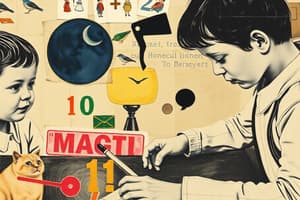Podcast
Questions and Answers
What is the primary goal of using instructional tasks in a learning trajectory?
What is the primary goal of using instructional tasks in a learning trajectory?
- To help students develop a deeper understanding of a topic by progressing through different levels of thinking. (correct)
- To create a fun and engaging learning environment for students.
- To assess students' individual learning styles and adapt instruction accordingly.
- To provide students with a variety of activities to choose from.
What is one key role a teacher plays in creating a conducive math learning environment?
What is one key role a teacher plays in creating a conducive math learning environment?
- Focusing on individual learning rather than group activities.
- Prioritizing memorization of formulas and procedures.
- Providing students with a variety of learning materials and resources. (correct)
- Encouraging competition among students to motivate learning.
Which of the following is NOT mentioned as a component of 'Necessary Mathematics' as defined in the text?
Which of the following is NOT mentioned as a component of 'Necessary Mathematics' as defined in the text?
- Mathematics for personal finance and budgeting. (correct)
- Mathematics used in scientific fields like physics.
- Mathematics required for effective communication and language skills.
- Mathematics essential for understanding music theory and composition.
How do teachers benefit from understanding developmental paths in their students?
How do teachers benefit from understanding developmental paths in their students?
What is a key expectation for students completing primary grades in the Philippines?
What is a key expectation for students completing primary grades in the Philippines?
What is the primary purpose of 'Social and Personal Mathematics', as mentioned in the text?
What is the primary purpose of 'Social and Personal Mathematics', as mentioned in the text?
Which of the following is NOT a characteristic of a conducive learning environment in a mathematics classroom?
Which of the following is NOT a characteristic of a conducive learning environment in a mathematics classroom?
What is the primary focus of 'Appreciation of Mathematics as an Element of Culture', as described in the text?
What is the primary focus of 'Appreciation of Mathematics as an Element of Culture', as described in the text?
Which strand includes the study of properties of two- and three-dimensional figures?
Which strand includes the study of properties of two- and three-dimensional figures?
What does the Patterns and Algebra strand primarily emphasize?
What does the Patterns and Algebra strand primarily emphasize?
Which strand is focused on collecting and organizing data?
Which strand is focused on collecting and organizing data?
What is one of the key focuses of the Measurement strand?
What is one of the key focuses of the Measurement strand?
What is the overall purpose of the K to 10 Mathematics Curriculum?
What is the overall purpose of the K to 10 Mathematics Curriculum?
What are the three parts of math learning trajectories?
What are the three parts of math learning trajectories?
Why are learning trajectories necessary for teaching mathematics to children?
Why are learning trajectories necessary for teaching mathematics to children?
What should the goals of a mathematical learning trajectory include?
What should the goals of a mathematical learning trajectory include?
How does the developmental path in a learning trajectory function?
How does the developmental path in a learning trajectory function?
Which mathematical concepts are included in the learning trajectories?
Which mathematical concepts are included in the learning trajectories?
What is a critical aspect of understanding children's mathematical development?
What is a critical aspect of understanding children's mathematical development?
What role do instructional tasks play in a learning trajectory?
What role do instructional tasks play in a learning trajectory?
What is meant by a 'developmentally appropriate' learning environment in mathematics?
What is meant by a 'developmentally appropriate' learning environment in mathematics?
What does Experiential Learning emphasize as a key component of the learning process?
What does Experiential Learning emphasize as a key component of the learning process?
Which learning theory suggests that knowledge is constructed by connecting new information to prior experiences?
Which learning theory suggests that knowledge is constructed by connecting new information to prior experiences?
What is a key feature of Cooperative Learning?
What is a key feature of Cooperative Learning?
Which principle is emphasized in Inquiry-based Learning?
Which principle is emphasized in Inquiry-based Learning?
What do the underlying learning principles in the mathematics curriculum primarily support?
What do the underlying learning principles in the mathematics curriculum primarily support?
Which aspect is a characteristic of Reflective Learning?
Which aspect is a characteristic of Reflective Learning?
What is emphasized in Situated Learning according to the theories mentioned?
What is emphasized in Situated Learning according to the theories mentioned?
Which area is NOT explicitly mentioned as part of the mathematics curriculum content?
Which area is NOT explicitly mentioned as part of the mathematics curriculum content?
What are the twin goals of mathematics education in K-10?
What are the twin goals of mathematics education in K-10?
Which of the following is a definition of critical thinking as described in the framework?
Which of the following is a definition of critical thinking as described in the framework?
What is the purpose of having organized curriculum content in mathematics education?
What is the purpose of having organized curriculum content in mathematics education?
Identify the content areas included in the K-10 mathematics curriculum.
Identify the content areas included in the K-10 mathematics curriculum.
What process is highlighted in mathematical problem-solving according to Polya?
What process is highlighted in mathematical problem-solving according to Polya?
What type of skills and processes does the curriculum aim to develop?
What type of skills and processes does the curriculum aim to develop?
Which of the following values is to be fostered through the mathematics education framework?
Which of the following values is to be fostered through the mathematics education framework?
What role do appropriate tools play in mathematics education according to the framework?
What role do appropriate tools play in mathematics education according to the framework?
What is the first stage in the teaching cycle?
What is the first stage in the teaching cycle?
During which stage of the teaching cycle are learning activities conducted?
During which stage of the teaching cycle are learning activities conducted?
What important aspect should be considered when planning instruction?
What important aspect should be considered when planning instruction?
What is the purpose of checking for understanding during the lesson implementation?
What is the purpose of checking for understanding during the lesson implementation?
Which stage in the teaching cycle focuses on evaluating the effectiveness of the teaching strategies used?
Which stage in the teaching cycle focuses on evaluating the effectiveness of the teaching strategies used?
What analogy is used to describe the teaching cycle?
What analogy is used to describe the teaching cycle?
What aspect does the implementation stage emphasize regarding teaching plans?
What aspect does the implementation stage emphasize regarding teaching plans?
Why is it important for a teacher to check whether objectives were achieved after a lesson?
Why is it important for a teacher to check whether objectives were achieved after a lesson?
Flashcards
Developmental Paths
Developmental Paths
The knowledge that helps teachers assess and understand children's thinking stages.
Instructional Tasks
Instructional Tasks
Activities matched to levels of thinking in a child's developmental progression.
Role of a Teacher
Role of a Teacher
Creating an engaging environment for children to thrive in their learning journey.
Primary Grades
Primary Grades
Signup and view all the flashcards
Necessary Mathematics
Necessary Mathematics
Signup and view all the flashcards
Social and Personal Mathematics
Social and Personal Mathematics
Signup and view all the flashcards
Cultural Appreciation of Mathematics
Cultural Appreciation of Mathematics
Signup and view all the flashcards
Conducive Learning Environment
Conducive Learning Environment
Signup and view all the flashcards
Mathematical Development
Mathematical Development
Signup and view all the flashcards
Math Learning Trajectory
Math Learning Trajectory
Signup and view all the flashcards
Mathematical Goal
Mathematical Goal
Signup and view all the flashcards
Levels of Thinking
Levels of Thinking
Signup and view all the flashcards
Importance of Learning Trajectories
Importance of Learning Trajectories
Signup and view all the flashcards
Child's Viewpoint
Child's Viewpoint
Signup and view all the flashcards
Numbers and Number Sense
Numbers and Number Sense
Signup and view all the flashcards
Measurement
Measurement
Signup and view all the flashcards
Geometry
Geometry
Signup and view all the flashcards
Patterns and Algebra
Patterns and Algebra
Signup and view all the flashcards
Statistics and Probability
Statistics and Probability
Signup and view all the flashcards
Curriculum Goals
Curriculum Goals
Signup and view all the flashcards
Critical Thinking
Critical Thinking
Signup and view all the flashcards
Problem Solving
Problem Solving
Signup and view all the flashcards
Content Areas
Content Areas
Signup and view all the flashcards
Key Skills in Math
Key Skills in Math
Signup and view all the flashcards
Values and Attitudes
Values and Attitudes
Signup and view all the flashcards
Teaching Tools
Teaching Tools
Signup and view all the flashcards
Context in Learning
Context in Learning
Signup and view all the flashcards
Teaching Cycle
Teaching Cycle
Signup and view all the flashcards
Identify Objectives
Identify Objectives
Signup and view all the flashcards
Plan Instruction
Plan Instruction
Signup and view all the flashcards
Implement Plan
Implement Plan
Signup and view all the flashcards
Checking for Understanding
Checking for Understanding
Signup and view all the flashcards
Reflecting on Teaching
Reflecting on Teaching
Signup and view all the flashcards
Flexibility in Teaching
Flexibility in Teaching
Signup and view all the flashcards
Evaluation of Objectives
Evaluation of Objectives
Signup and view all the flashcards
Contexts
Contexts
Signup and view all the flashcards
Experiential Learning
Experiential Learning
Signup and view all the flashcards
Situated Learning
Situated Learning
Signup and view all the flashcards
Reflective Learning
Reflective Learning
Signup and view all the flashcards
Constructivism
Constructivism
Signup and view all the flashcards
Cooperative Learning
Cooperative Learning
Signup and view all the flashcards
Discovery Learning
Discovery Learning
Signup and view all the flashcards
Mathematics Content
Mathematics Content
Signup and view all the flashcards
Study Notes
Importance of Math in Early Years
- Children need math for counting in daily life, from small to large tasks
- Math helps with money skills, including counting change and shopping.
- Essential life skills, like telling time, using a clock, calculating time, temperature are Math related.
- Math is the foundation for other subjects, like accounting, statistics, physics, and chemistry.
- Math is crucial for higher education opportunities and career options
- Excelling in math is a key skill for success in the modern job market
Learning Trajectories
- Math knowledge in early years predicts later math and reading skills
- Primary-grade children have substantial potential to master intricate math problems in elementary education.
- Children can learn abstract math concepts without needing physical objects.
Learning Trajectories (Paths) Approach
- Early math knowledge substantially influences later math and reading skills
- Understanding children's mathematical development helps teachers to know how to teach math better.
- Math learning trajectories for all ages and topics
Role of a Teacher
- Create engaging and encouraging environment for young learners
- Use peer teaching, resourceful learning materials, and conducive learning environment
- Provide activities at appropriate learning levels
- Use appropriate grouping strategies
Necessary Mathematics in School
- Math is used in multiple school subjects, not just mathematics itself
- Math has social, personal, and cultural value and relevance
Conceptual Framework of Mathematics Education
- Math is a subject present in many situations
- Critical thinking and problem-solving are central goals
- Multiple content areas are covered like numbers, measurements, geometry, patterns and algebra alongside probability and statistics
- Key skills include understanding, estimating, solving, visualizing, modelling, representing, conjecturing, reasoning, proving, and application across content areas
- Positive values such as accuracy, creativity, objectivity, perseverance, and productivity, are emphasized to improve the teaching and learning approach
Mathematics Curriculum in the Primary Grades
- The curriculum is organized in a logical structure considering content, performance, and learning competencies
- Grade levels have associated key performance standards
- Different methods like data collection, pictographs and bar graphs are covered to build math competency
Experiential Learning
- Learning is active, meaning-making from experience
- Situated learning is applying concepts in real-life contexts
- Understanding and deriving meaning from experience is a critical component
Constructivist Theory
- Students actively construct their understanding
- The teacher acts as a facilitator, guiding students in their learning
- Students connect new ideas to prior experiences and knowledge
- Learning is context dependent and deeply related to students' experience
- The classroom becomes place for dialogue and sharing ideas
The Teaching Cycle
- There are 6 common stages of the teaching cycle
- Identifying objectives (learning skills and content)
- Planning instruction(strategies, material, teaching activities)
- Implementation (plan execution and observation)
- Checking for understanding (assessments for learning, evaluation)
- Reflection on practice (analysis of effectiveness, adjustments for next time)
- Reflecting on teaching (assessment of the teaching process, improvement in strategies)
Planning Considerations
- Researching the subject matter from the curriculum guide, books, websites
- Defining clear learning objectives (knowledge and skills)
- Understanding the student needs, interests, and learning styles
- Using appropriate teaching strategies and materials
- Assessing student understanding and adapting the lesson as needed
- Building rapport and fostering a supportive learning environment
Studying That Suits You
Use AI to generate personalized quizzes and flashcards to suit your learning preferences.




